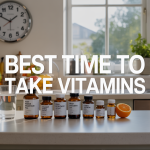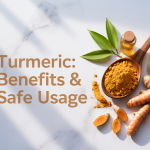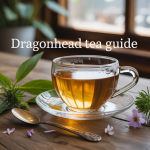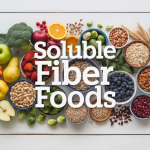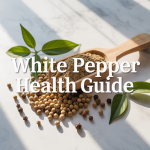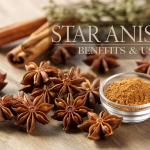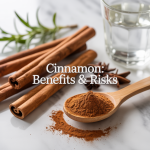Your eyes work hard every day, and the right foods can help keep your eyes healthy for years to come. This guide is for anyone who wants to protect their vision through simple dietary changes – whether you’re already experiencing vision changes, have a family history of eye problems, or just want to stay ahead of potential issues.
Smart food choices can make a real difference in maintaining sharp vision and preventing age-related eye conditions. We’ll explore the best protein sources that support eye health, from omega-3 rich fish to zinc-packed eggs and lean meats. You’ll also discover which colorful vegetables pack the most vision-boosting nutrients, and learn about the key vitamins and minerals your eyes need daily.
Finally, we’ll show you how to put it all together with practical meal planning tips and additional lifestyle habits that work alongside good nutrition to keep your eyes in top shape.
Essential Eye-Healthy Foods to Add to Your Diet
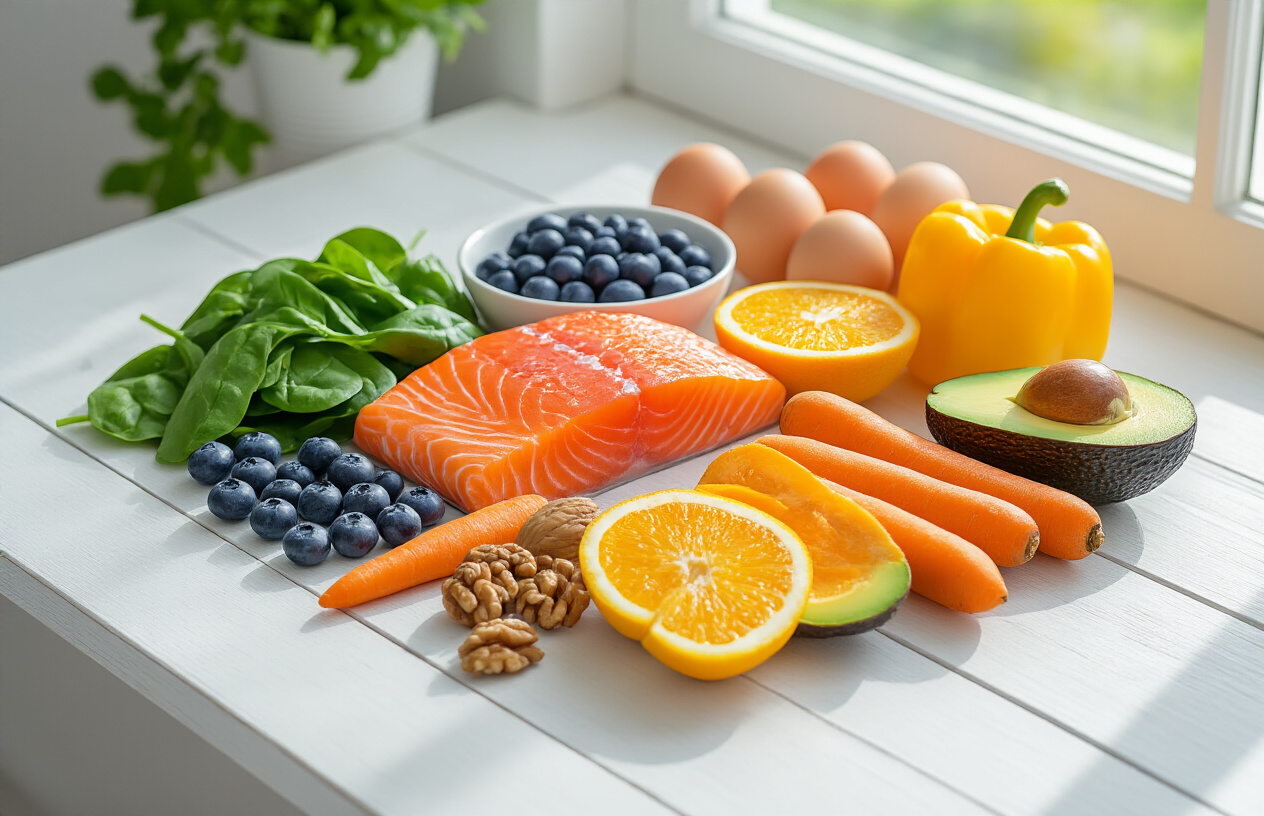
Omega-3 Rich Fish for Better Vision
Fish are rich in omega-3 fatty acids, which provide significant benefits for eye health. These essential fatty acids play a crucial role in maintaining optimal vision and protecting against various eye conditions. Some of the best fish richest in omega-3 include tuna, salmon, mackerel, sardines, and anchovies. These fatty fish varieties should be incorporated into your regular diet to support long-term eye health and visual acuity.
Vitamin C Powerhouses: Red Peppers and Citrus Fruits
Raw red peppers contain a high amount of vitamin C per calorie, making them exceptional choices for supporting eye health. Vitamin C is beneficial for the blood vessels in the eyes and can lower the risk of cataracts, which is one of the leading causes of vision impairment. The antioxidant properties of vitamin C help protect the delicate structures within your eyes from oxidative damage.
Other foods rich in vitamin C that complement red peppers include strawberries, cauliflower, and bok choy. These diverse options ensure you can easily incorporate vitamin C into your daily meals while enjoying variety in your diet.
Nutrient-Dense Seeds and Nuts
Seeds are very high in omega-3s and vitamin E, both beneficial for eye health. These nutrient powerhouses provide concentrated doses of essential vitamins and healthy fats that support overall eye function. Chia seeds, flax seeds, and hemp seeds are excellent choices for optimal fatty acids and vitamins that promote healthy vision.
The combination of omega-3 fatty acids and vitamin E in seeds creates a synergistic effect that helps protect the eyes from age-related damage and inflammation.
Dark Leafy Greens for Macular Protection
Dark, leafy vegetables like spinach and kale are rich in antioxidants called carotenoids. Carotenoids are thought to reduce the risk of developing or slowing Age-related Macular Degeneration (AMD), which affects central vision and can significantly impact quality of life. These greens also contain lutein and zeaxanthin, two specific carotenoids that accumulate in the retina and act as natural filters against harmful blue light exposure.
Protein Sources That Support Eye Health
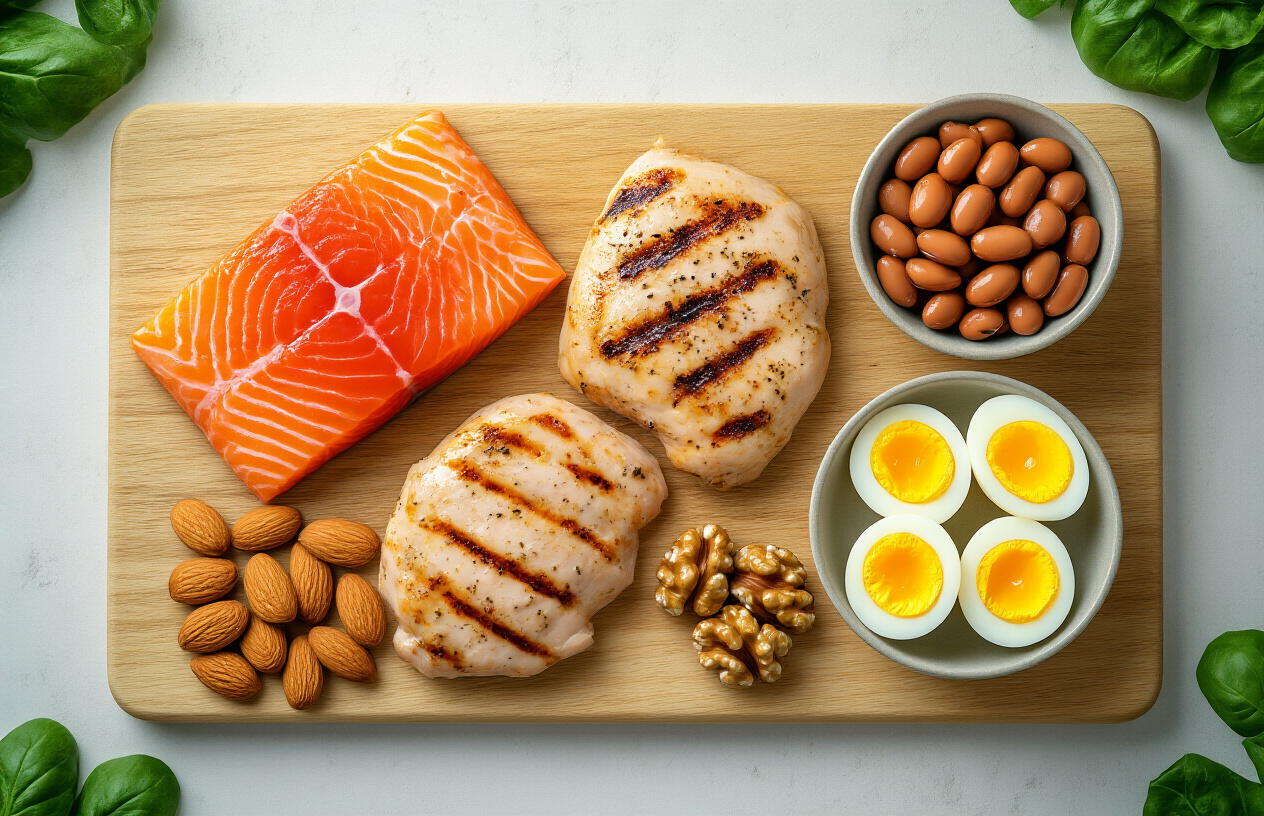
Lean Meats and Poultry for Zinc Benefits
Incorporating lean meats and poultry into your diet provides substantial eye health benefits through their high zinc content. Zinc plays a crucial role in transporting vitamin A from the liver to the retina, where this essential vitamin is converted into melanin—a protective pigment that shields your eyes from potential damage.
Quality protein sources that deliver optimal zinc levels include:
- Beef: Particularly lean cuts provide concentrated zinc while maintaining protein quality
- Pork: Lean varieties offer excellent zinc bioavailability for eye health
- Chicken: A versatile option that combines high zinc content with lean protein benefits
While these meats provide significant zinc benefits, it’s worth noting that oysters contain the highest zinc concentrations among all food sources. The zinc obtained from these protein sources ensures efficient vitamin A utilization, supporting the retina’s ability to produce melanin effectively.
Eggs for Lutein and Blue Light Protection
Eggs represent a powerhouse combination for comprehensive eye protection. The zinc content in eggs works synergistically with the lutein and zeaxanthin concentrated in egg yolks, creating a dual-action defense system for your vision.
This nutritional partnership enables your body to:
- Effectively utilize lutein and zeaxanthin through zinc’s facilitative properties
- Block harmful blue light that poses risks to retinal health
- Protect against potential retinal damage from digital device exposure
The lutein and zeaxanthin compounds found specifically in egg yolks act as natural filters, absorbing high-energy blue light wavelengths before they can reach and potentially harm the delicate retinal tissues.
Beans and Legumes for Vegetarian Eye Nutrition
For individuals following vegan or vegetarian lifestyles, beans and legumes provide exceptional eye health support without compromising dietary preferences. These plant-based protein sources deliver comprehensive nutritional benefits specifically targeting vision maintenance and enhancement.
The eye health advantages of beans and legumes include:
- High zinc content: Essential for vitamin A transport and retinal function
- Low-fat profile: Supports overall cardiovascular health, benefiting ocular blood flow
- High fiber content: Promotes systemic health that indirectly benefits eye function
- Multiple vitamin sources: Various vitamins work collectively to maintain sharper vision
These versatile foods ensure that vegetarian and vegan dieters don’t miss out on crucial eye-supporting nutrients typically found in animal proteins, providing a complete nutritional foundation for long-term vision health.
Colorful Vegetables That Boost Vision
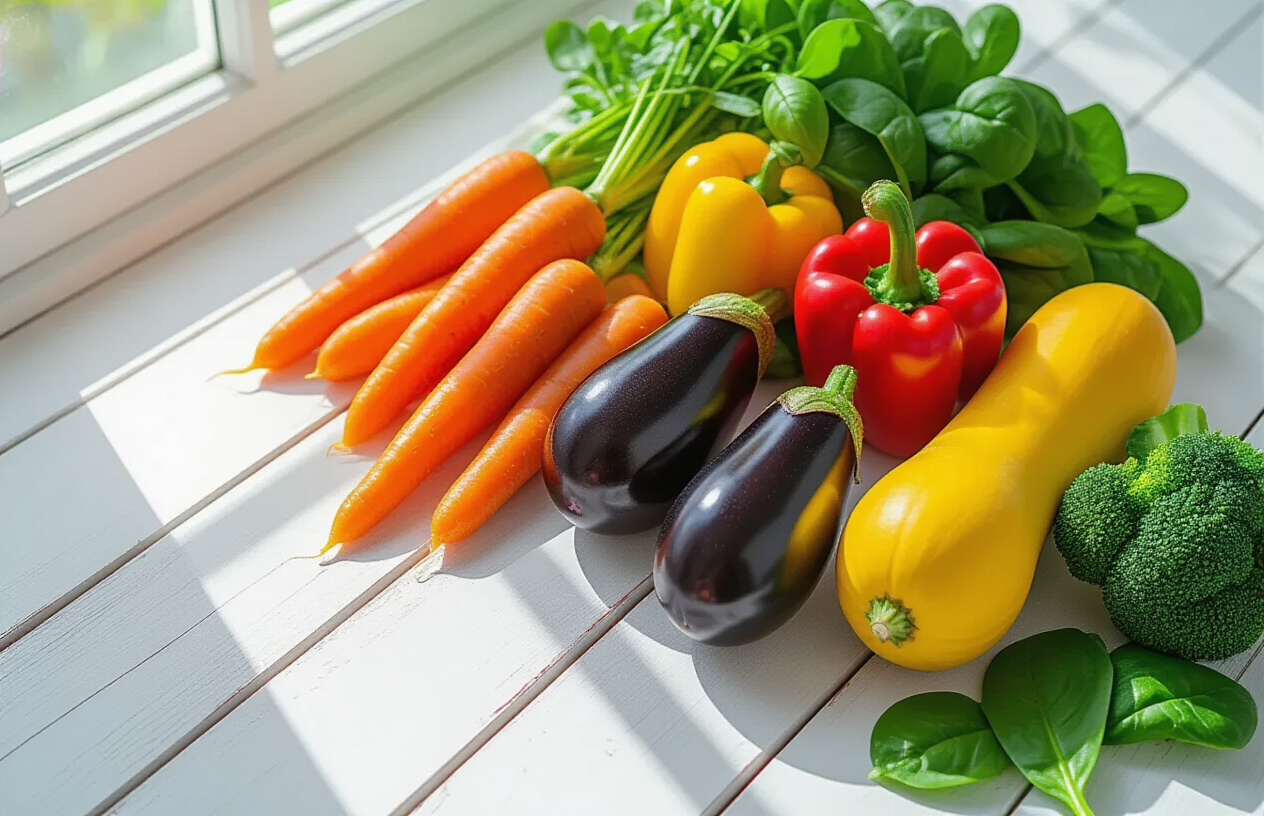
Carrots and Orange Vegetables for Night Vision
Orange-colored fruits and vegetables stand as nutritional powerhouses for maintaining optimal eye health, particularly when it comes to enhancing night vision capabilities. Carrots, sweet potatoes, and mangoes are exceptional sources of beta-carotene, a vital nutrient that serves as a precursor to vitamin A in the human body. This essential vitamin A plays a crucial role in helping your eyes adapt to low-light conditions, making it easier to see clearly in dimly lit environments.
The beta-carotene found in these vibrant orange foods undergoes conversion to retinal, a key component of rhodopsin – the light-sensitive protein in your retina that enables vision in darkness. By incorporating these nutrient-dense foods into your daily meals, you’re providing your eyes with the raw materials they need to function optimally during nighttime hours. Sweet potatoes offer an additional benefit with their high fiber content and complex carbohydrates, while mangoes provide a delicious way to boost your beta-carotene intake alongside natural sugars and additional vitamins.
Broccoli and Brussels Sprouts for Antioxidant Protection
Now that we have covered orange vegetables for night vision, let’s examine the remarkable protective benefits of green cruciferous vegetables. Broccoli and Brussels sprouts contain a powerful combination of essential vitamins that work synergistically to shield your eyes from harmful free radicals. These vegetables are particularly rich in vitamin A, vitamin C, and vitamin E – three antioxidant vitamins that form a protective barrier against oxidative stress.
Free radicals are unstable molecules that can damage delicate eye tissues over time, potentially contributing to various vision problems. The antioxidant trio found in broccoli and Brussels sprouts neutralizes these harmful compounds before they can cause cellular damage. Vitamin A supports retinal health, vitamin C strengthens blood vessels in the eyes, and vitamin E protects cell membranes from oxidative damage. This comprehensive antioxidant protection makes these green vegetables indispensable allies in maintaining long-term eye health and preventing age-related vision decline.
Water for Preventing Dry Eyes
With this in mind, next, we’ll see how proper hydration plays a fundamental role in eye health maintenance. Water consumption proves crucial for optimal eye function, serving as the foundation for preventing dehydration and the uncomfortable condition of dry eyes. Your eyes rely on adequate moisture to maintain their protective tear film, which lubricates the eye surface and provides essential nutrients to the cornea.
When your body lacks sufficient water, your eyes are among the first organs to show signs of dehydration through decreased tear production and increased discomfort. Maintaining proper hydration levels ensures that your tear glands can produce the quality and quantity of tears necessary for eye comfort and clear vision. This simple yet vital practice contributes significantly to overall eye health by supporting the natural mechanisms that keep your eyes moist, comfortable, and functioning at their best throughout the day.
Key Nutrients Your Eyes Need Daily
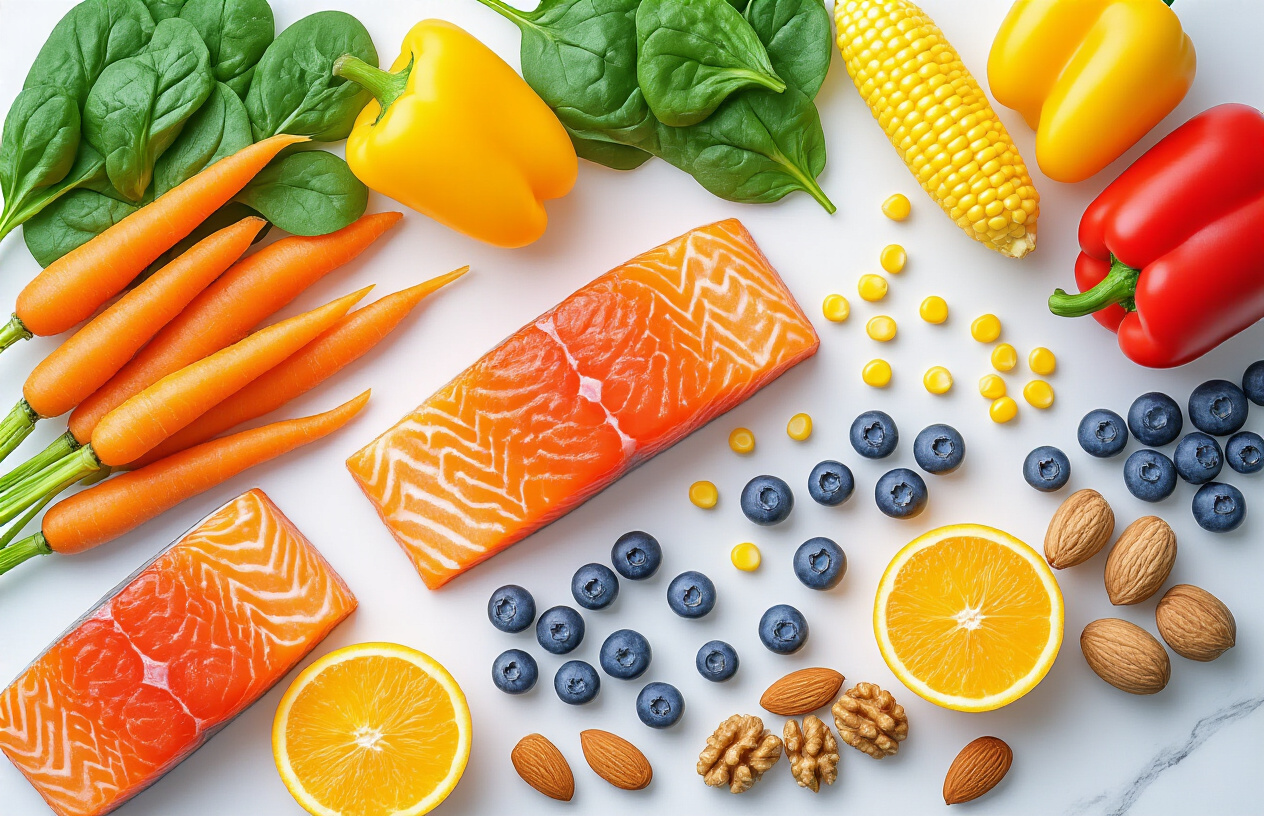
Essential Vitamins and Minerals for Optimal Vision
Your eyes require specific nutrients to function at their peak and maintain long-term health. The most critical nutritional elements for maintaining good eye health include vitamin C, vitamin E, lutein, zeaxanthin, zinc oxide, and copper oxide. These powerhouse nutrients work together to create a comprehensive defense system for your vision, each playing a unique role in protecting and nourishing different parts of your eye structure.
Vitamin C and vitamin E serve as potent antioxidants, while lutein and zeaxanthin act as natural filters for harmful light. The mineral components, zinc oxide and copper oxide, support cellular processes essential for proper eye function. Understanding these key nutrients represents the foundation for making informed dietary choices that will benefit your vision throughout your lifetime.
Daily Recommended Amounts for Eye Health
Now that we have covered the essential nutrients, let’s examine the specific daily targets your eyes need to thrive. For optimal eye health, aim for 500 milligrams of vitamin C daily, which significantly exceeds the general health recommendations but provides enhanced protection for your delicate eye tissues.
Your daily vitamin E intake should reach 400 international units to maximize its protective benefits. For the carotenoids that specifically accumulate in your retina, target 10 mg of lutein paired with 2 mg of zeaxanthin each day. These amounts have been specifically researched for their eye health benefits.
The mineral requirements include 80 mg of zinc oxide and 2 mg of copper oxide daily. These precise amounts create the optimal nutritional environment for your eyes to maintain their complex functions and repair processes effectively.
How These Nutrients Protect Your Vision
With this foundation of knowledge about daily requirements, let’s explore the specific protective mechanisms these nutrients provide. Vitamin C plays a crucial role in supporting the blood vessels throughout your eyes and can significantly lower your risk of developing cataracts, one of the most common age-related vision problems.
Vitamin E functions as a powerful shield, helping protect your eyes from free radicals that can cause cellular damage over time. This protection is especially important given the constant exposure your eyes face from environmental stressors and light.
Lutein and zeaxanthin offer dual protection by reducing the risk of developing age-related macular degeneration (AMD) or slowing its progression if already present. Additionally, these carotenoids help block harmful blue light that can damage retinal cells.
Zinc serves a vital transport function, helping carry vitamin A to the retina where it’s needed to produce melanin, a protective pigment that shields your eyes from potential damage. This mineral essentially acts as a delivery system for other crucial eye-protecting compounds.
Weekly Meal Planning for Healthy Eyes

Sample 7-Day Eye-Healthy Menu
Monday: Start your week with scrambled eggs with spinach and red peppers, paired with whole grain toast for breakfast. At lunch, enjoy a grilled chicken salad featuring mixed greens, carrots, and sunflower seeds. Complete the day with baked salmon accompanied by steamed broccoli and quinoa for dinner.
Tuesday: Begin with Greek yogurt topped with chia seeds, berries, and honey. For lunch, savor a quinoa salad loaded with black beans, corn, red peppers, and cilantro. Dinner features stir-fried tofu with broccoli, bell peppers, and brown rice.
Wednesday: Fuel your morning with a vegetable omelette containing spinach, red peppers, and onions. Lunch consists of lentil soup with a side of mixed green salad. End with grilled chicken breast alongside roasted carrots and mixed greens.
Thursday: Blend up a smoothie with spinach, banana, chia seeds, and almond milk for breakfast. Midday brings chickpea and vegetable stir-fry with carrots and broccoli over brown rice. Dinner showcases baked cod with steamed green beans and mashed sweet potatoes.
Friday: Enjoy whole grain toast topped with avocado, poached eggs, and cherry tomatoes. Lunch features a turkey and vegetable wrap with spinach, carrots, and red peppers. Conclude with beef and bean chili served with cornbread.
Saturday: Begin with a spinach and mushroom frittata. Lunch offers a mixed bean salad combining kidney beans, black beans, red peppers, and lime vinaigrette. Dinner presents grilled shrimp with quinoa and steamed broccoli.
Sunday: Start with oatmeal topped with chia seeds, banana slices, and almond butter. Lunch features a grilled chicken Caesar salad with dark leafy greens and sunflower seeds. End the week with baked tilapia accompanied by roasted Brussels sprouts and sweet potato wedges.
Combining Foods for Maximum Nutrient Absorption
Now that we have covered the weekly meal plan, it’s important to understand how proper food combinations can enhance nutrient absorption for optimal eye health. While specific pairing strategies weren’t detailed in the available information, the meal plans naturally incorporate complementary foods that work synergistically to support vision health.
Easy Snack Options for Eye Health
With this foundation of eye-healthy meals in mind, maintaining your vision support throughout the day requires strategic snacking. Consider these nutrient-dense options that perfectly complement your meal plan:
Hummus with carrot sticks provides beta-carotene and plant-based protein. Sliced cucumber and red peppers with tzatziki offer hydration and antioxidants. Apple slices with almond butter combine natural sweetness with healthy fats and vitamin E.
A handful of mixed nuts and seeds delivers essential omega-3 fatty acids and zinc. Greek yogurt with honey and a sprinkle of chia seeds provides protein and omega-3s. Baby carrots with hummus doubles down on beta-carotene intake. Sliced bell peppers with guacamole rounds out your options with vitamin C and healthy monounsaturated fats.
These snacks seamlessly integrate into your daily routine while maintaining consistent eye-healthy nutrition between meals.
Additional Lifestyle Habits That Protect Your Vision

UV Protection and Sunglasses
Excessive sun exposure can be particularly damaging to the eyes, making proper UV protection a critical component of maintaining healthy vision throughout your lifetime. Wearing sunglasses whenever you are outside serves as your first line of defense against harmful ultraviolet radiation that can contribute to various eye conditions over time.
The importance of consistent UV protection cannot be overstated, as cumulative sun damage affects the delicate structures of your eyes. Quality sunglasses should block both UVA and UVB rays to provide comprehensive protection. This simple habit becomes even more crucial during peak sun hours and in environments with increased UV reflection, such as near water, snow, or sand.
Regular Eye Examinations and Screenings
Getting a regular eye examination to check the health of your eyes represents one of the most proactive steps you can take for long-term vision preservation. These comprehensive screenings allow eye care professionals to detect potential issues before they become serious problems, enabling early intervention when treatments are most effective.
The importance of routine eye examinations becomes even more significant if you have a family history of eye disease. Genetic predisposition to conditions like glaucoma, macular degeneration, or diabetic retinopathy makes regular monitoring essential for maintaining optimal eye health. Early detection through consistent screenings can help preserve your vision and prevent progression of hereditary eye conditions.
Screen Time Management and Eye Strain Prevention
With this in mind, managing digital eye strain has become increasingly important in our technology-driven world. Looking away from your computer every 20 minutes or so to reduce eye strain is a simple yet effective strategy that can significantly impact your daily comfort and long-term eye health.
This practice helps relax the focusing muscles in your eyes and reduces the fatigue that accumulates from prolonged near-vision tasks. Extended screen time without breaks can lead to symptoms including dry eyes, blurred vision, headaches, and neck tension, all of which can be minimized through proper screen time management and regular visual breaks.
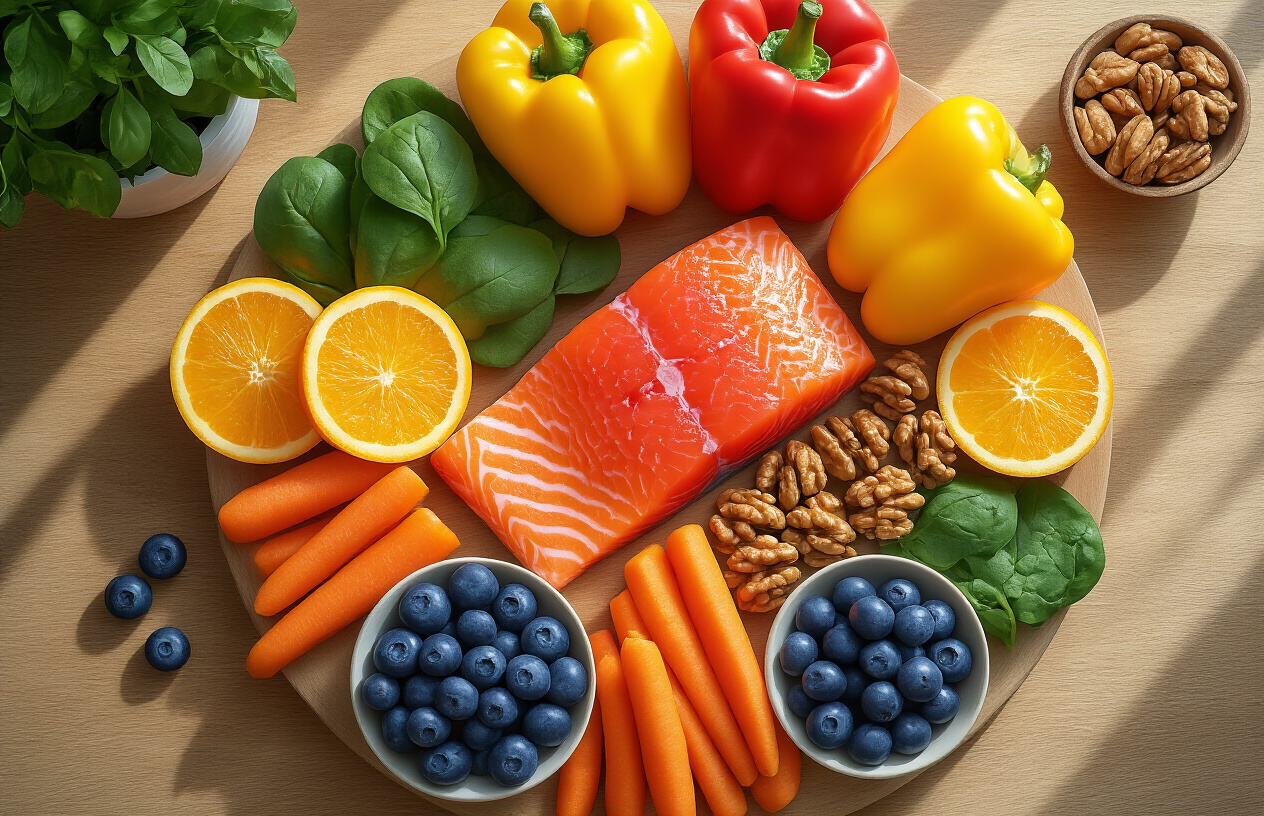
Taking care of your eyes through proper nutrition is one of the most effective ways to protect your vision for years to come. By incorporating eye-healthy foods like omega-3 rich fish, colorful vegetables packed with antioxidants, and nutrient-dense proteins into your daily meals, you’re providing your eyes with the essential vitamins and minerals they need to function optimally. The key nutrients – vitamin C, vitamin E, lutein, zeaxanthin, and zinc – work together to shield your eyes from damage and support overall eye health.
Remember that maintaining healthy vision goes beyond just eating the right foods. Combining a well-planned, eye-friendly diet with protective lifestyle habits like wearing sunglasses, taking regular screen breaks, and scheduling routine eye exams creates a comprehensive approach to eye care. Start small by adding one or two eye-healthy foods to your meals this week, and gradually build toward a more complete nutrition plan that will serve your vision well into the future.

